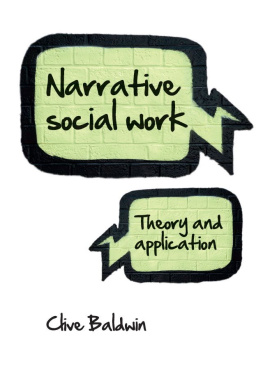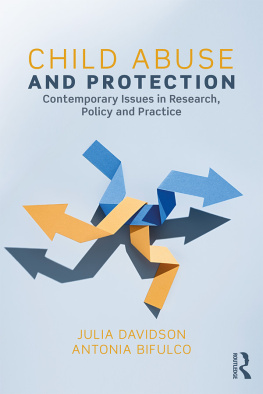THE W WORD
Witchcraft labelling
and child safeguarding
in social work practice
Other books you may be interested in:
Anti-racism in Social Work Practice
Edited by Angie Bartoli ISBN 978-1-909330-13-9
Mental Health and the Criminal Justice System
Ian Cummins ISBN 978-1-910391-90-7
Modern Mental Health: Critical Perspectives on Psychiatric Practice
Edited by Steven Walker ISBN 978-1-909330-53-5
Observing Children and Families: Beyond the Surface
By Gill Butler ISBN 978-1-910391-62-4
Psychosocial and Relationship-based Practice
By Claudia Megele ISBN 978-1-909682-97-9
Social Media and Social Work Education
Edited by Joanne Westwood ISBN 978-1-909682-57-3
Understanding Substance Use: Policy and Practice
By Elaine Arnull ISBN 978-1-909330-93-1
Whats Your Problem? Making Sense of Social Policy and the Policy Process
By Stuart Connor ISBN 978-1-909330-49-8
Titles are also available in a range of electronic formats. To order please go to our website www.criticalpublishing.com or contact our distributor NBN International, 10 Thornbury Road, Plymouth PL6 7PP, telephone 01752 202301 or email orders@nbninternational.com
THE W WORD
Witchcraft labelling
and child safeguarding
in social work practice
Prospera Tedam
& Awura Adjoa
First published in 2017 by Critical Publishing Ltd
All rights reserved. No part of this publication may be reproduced, stored in a retrieval system, or transmitted in any form or by any means, electronic, mechanical, photocopying, recording or otherwise, without prior permission in writing from the publisher.
Copyright 2017 Prospera Tedam, Awura Adjoa
Cartoons Harry Venning
British Library Cataloguing in Publication Data
A CIP record for this book is available from the British Library
ISBN: 978-1-912096-00-8
This book is also available in the following e-book formats:
MOBI ISBN: 978-1-912096-72-5
EPUB ISBN: 978-1-912096-71-8
Adobe e-book ISBN: 978-1-912096-70-1
The rights of Prospera Tedam and Awura Adjoa to be identified as the Authors of this work have been asserted by them in accordance with the Copyright, Design and Patents Act 1988.
Cartoons by Harry Venning
Cover design by Out of House
Text design by Greensplash Limited
Project management by Out of House Publishing
Print managed and manufactured by Jellyfish Solutions
Critical Publishing
3 Connaught Road
St Albans AL3 5RX
www.criticalpublishing.com
Paper from responsible sources
Contents
Prospera Tedam is the lead for Social Work Practice Quality at Anglia Ruskin University where she has worked since 2016. Her research interests include human rights with a particular focus on children, cultural competency and legal frameworks for social work. She is also the past chair of the voluntary organisation AFRUCA (Africans Unite Against Child Abuse). Prospera is also a member of the Independent Families Returns Panel for the UK Border Agency.
Awura Adjoa is the pseudonym chosen by this author in order to maintain her anonymity. Originally from West Africa and now a university graduate, Awura sees it as her duty to share her experiences of a childhood which was disrupted as a result of being labelled a witch. She has a renewed commitment to making a difference in the lives of children who may be similarly affected or at risk of this form of abuse in the UK and abroad.
By the early 1970s when I started working in child protection, health and welfare professionals were experiencing the shockwaves from the observations of luminaries such as Frederic Silverman and Henry Kempe who in 1962 published The Battered-Child Syndrome in the Journal of the American Medical Association. Many practitioners were incredulous that apparently caring parents could knowingly neglect and harm their children. Our imaginations were stretched further when, during the 1980s, the extent of child sexual abuse became apparent. I recall working with the mother of a ten-day-old baby, whose extensive internal damage was inflicted by her father, a convicted paedophile. I then watched attentively as a boy, whose body was severely limited by cerebral palsy, resolutely tapped out on his word-board his experiences of sexual exploitation. Had I not directly witnessed the aftermath of such violations, I would have found them hard to believe. How could anyone sexually assault such very vulnerable children? We learned that the mantra for all of us working in the field of child development and welfare had to be: imagine the unimaginable; believe the unbelievable; think the unthinkable.
Witchcraft accusations might seem to be consigned to history. The Salem or Pendle witch trials were events of a long bygone age and any modern witchcraft, particularly involving children, is the stuff of fairytale or fantasy such as Sleeping Beauty, Harry Potter or The Worst Witch. Nevertheless, unimaginable as it is, children throughout the world, including those living in Britain and other largely secular societies, suffer from being denounced as witches. Consequently, as well as isolation and stigma, they may have to endure beatings and starvation and some are killed. And yet would a child labelled as a witch, if able to disclose this, be believed? Might teachers and other professionals simply assume that she has an over-active imagination or, if traumatised by other life experiences, that she is merely recounting nightmares with no foundation in reality? A similar inability to believe children was common in the early days of our discovery of the extent and nature of sexual abuse. The only way of ensuring vulnerable children are protected is to become fully informed of the relevant dynamics and to view the abuse from the victims perspective.
This pioneering book provides essential information and insights. Awura Adjoa does not have to stretch her imagination because she directly experienced being denounced as a witch while living in Britain. In the early chapters her childhood experiences are recounted, along with analyses and prompts designed to explore readers thoughts and emotions engendered by the narrative. The later chapters apply theory to the issues and explore frameworks for assessing and responding to the labelling of children as witches. Additionally, the book provides insights into wider social issues around migration, culture, beliefs and family dynamics.
When faced with the potentially unimaginable, unbelievable and unthinkable, we need those who understand the issues, like Awura Adjoa and Prospera Tedam, to guide our thoughts so that we can appreciate the dynamics and recognise what is happening. I have great pleasure in recommending this groundbreaking book to all those who work in the field of childcare and who are committed to the principles of anti-discriminatory practice and are motivated to ensure that, whatever their background and culture, children are appropriately understood and protected.
Celia Doyle (PhD)
Safeguarding Children Consultant
We would like to acknowledge the support and encouragement of a number of people over the course of writing this book. We would like to thank our families, friends and colleagues for their faith in our abilities. We also wish to acknowledge Critical Publishing for seeing the potential of this book and for their unflinching support towards making this a reality.





